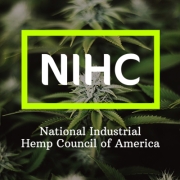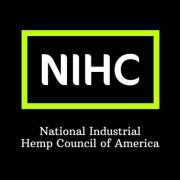
NIHC Member Rick Fox
Owner, Meristem Farms, LLC
Morrisville, VT
 Herrick (“Rick”) Fox has been a member of the NIHC since its inception and serves as co-chair of the NIHC Government Relations committee (GAC), with good reason. As owner of Meristem Farms, located in Vermont, he has an interest in securing a sound policy and regulatory foundation for hemp farms of all shapes and sizes, including smaller and independent farms like his, and he also has 15 years of policy, regulatory and management experience in USDA.
Herrick (“Rick”) Fox has been a member of the NIHC since its inception and serves as co-chair of the NIHC Government Relations committee (GAC), with good reason. As owner of Meristem Farms, located in Vermont, he has an interest in securing a sound policy and regulatory foundation for hemp farms of all shapes and sizes, including smaller and independent farms like his, and he also has 15 years of policy, regulatory and management experience in USDA.
Prior to starting Meristem Farms, Rick finished his 15-year career at USDA as an executive in USDA’s Foreign Agricultural Service, leading a division in agricultural capacity-building. Before that, being a forester by profession, he worked with USDA Forest Service, first in land management on National Forests and later in forest policy with senior USDA officials and the U.S. Senate Committee on Agriculture. He also served as policy expert for USAID capacity-building programs in Russia and the Republic of Georgia, and in the 1990s he worked in Russia for 6 years on conservation issues and forest science research in Siberia and the Russian Far East.
Here is more about Rick, his operation, and his thoughts on NIHC’s potential.
Tell us a bit about your business.
We grow and manufacture specialty hemp flower products in Northern Vermont. We focus on bringing out the character of the plant and the land through the distinctive aromatic profiles of our varieties and the growing conditions in our particular neck of the woods.
My wife, Jen Daniels and I founded the company with a strong land ethic. She’s a landscape architect and I’m a forester, and we both decided to leave the Federal government wanting to do something that more directly connects people with the land… what better way to do that than farm hemp for people’s health? So we really try to focus on what makes each variety special with the land and microclimate where we farm. Harvest season in Vermont is amazing, and we’re lucky to have regulations in Vermont that allow us to make the most of it.
How has your USDA experience helped you and the NIHC?
I was with USDA for 15 years, in a variety of management, rulemaking and senior policy positions, and I was lucky to detail to the Senate Ag Committee to help with the 2014 Farm Bill as well. Alongside helping Jen run our company, I know there aren’t many other folks in hemp farming with a USDA policy background, and fewer still who also have a background in science and statistics. So, I volunteer as much time as I can helping farmers, regulators and policymakers understand one another’s perspectives and the technical details that are critical to these regulations, in hopes that we can get better policy outcomes than what’s been put out there so far. I enjoy the challenges of building a hemp farming company from scratch—terrifying though it has been at times—but in a lot of ways I’m still a ‘recovering bureaucrat’ and I miss public service so the policy work I do with NIHC is a way for me to do that.
What is the focus of the NIHC GAC in 2021?
Some of the things we are focusing on are the USDA rule and on developments in a few states, such as California and New York. There still seems to be a lot of confusion on the part of regulators and policy makers about how their choices can impact smaller and independent hemp farms in particular. What may seem like arcane details of chemistry, statistics and semantics actually put many if not most farmers at huge risk, and regulators too, and for no public benefit at all. And, of course, regulations concerning hemp-derived products in foods and dietary supplements coming out of FDA and at the State level are a major focus as well. Hemp has such huge promise, not just for farming but for the broader economy, our environment and society in general and I don’t want to see it derailed by poorly crafted regulations.
Right now, it’s all a moving target, but I’m optimistic that the new Administration will get it right and I also think their emphasis on the rural economy, equity, and climate-smart agriculture present important opportunities for hemp as well.
What is the role of the NIHC in all this?
NIHC has a high degree of professionalism and its leadership has longstanding history with USDA and other sectors that are important to hemp production. That gives NIHC an ability to be uniquely effective in interfacing with USDA programs and procedures for the benefit of the industry, as we’re seeing in its efforts with MAP and check off programs, for example. I know first-hand that USDA is a complicated bureaucracy so I definitely appreciate that savvy.
I see NIHC working hard to become a big tent in the industry, supporting hemp farming of all kinds and promoting equitable value chains throughout the industry. We all share a grand vision of hemp for our future, but we recognize the need to serve the industry where it is today and help it grow in a way that brings everyone along. There is a lot of diversity in the hemp industry, all kinds of people and businesses – and NIHC is a voice for unity, so I’m proud to be a member.
There also needs to be better coordination with scientific and standard-setting organizations, and to make decisions implementable, with reasonable of expectations of success. NIHC can play a major role in addressing those kinds of problems and clarifying confusion in the market.
What is the potential of hemp in your view?
Hemp has enormous transformative potential, not just for agriculture but for manufacturing and energy as well, and if we can get the regulations right and put hemp on that kind of trajectory, then I can imagine hemp becoming a keystone crop for our economy in the not too distant future. Hemp is a great crop for CBD and other wellness products – that’s what we grow it for in my company – but though this will always be a significant part of the industry, the truly grand future for hemp is about food and especially fiber.
I also see hemp having huge trade potential. The world already knows American hemp is the best there is in the wellness market, and if we can unleash the ingenuity of American farmers and manufacturers I think we can easily become the world’s leader in climate-smart manufacturing and energy uses of hemp fiber, as well. But this will require public investments in R&D very quickly or we could lose that edge to our competitors around the world, so I’m hopeful Congress and the new Administration can see their way toward making that happen.
Check out Meristem Farms!



 Industry experts from various private and governmental sectors convened this week for the first-ever virtual 2021 National Hemp Symposium, brought to life by the National Academies of Sciences
Industry experts from various private and governmental sectors convened this week for the first-ever virtual 2021 National Hemp Symposium, brought to life by the National Academies of Sciences 


 Carpenter (left) has held some very prestigious prior roles in his career. He served for over ten years as the CEO of the North American Meat Institute (NAMI) where he worked closely with government regulators, including new food safety regulations and marketing. He also served for nearly 15 years as the Deputy Administrator for the USDA’s Agricultural Marketing Service, where he oversaw commodity checkoff programs. While at USDA, he represented the United States on the United Nation’s Committee on Agriculture from 1990 until 2006.
Carpenter (left) has held some very prestigious prior roles in his career. He served for over ten years as the CEO of the North American Meat Institute (NAMI) where he worked closely with government regulators, including new food safety regulations and marketing. He also served for nearly 15 years as the Deputy Administrator for the USDA’s Agricultural Marketing Service, where he oversaw commodity checkoff programs. While at USDA, he represented the United States on the United Nation’s Committee on Agriculture from 1990 until 2006.


 NIHC continues our work to serve as a credible resource to government officials in developing sound, common-sense regulations of America’s hemp economy. As part of those efforts, we have continued to engage the U.S. Senate Committee on Agriculture on a range of issues that have the potential to be included in 2023 farm bill development and negotiations anticipated to begin as early as this fall.
NIHC continues our work to serve as a credible resource to government officials in developing sound, common-sense regulations of America’s hemp economy. As part of those efforts, we have continued to engage the U.S. Senate Committee on Agriculture on a range of issues that have the potential to be included in 2023 farm bill development and negotiations anticipated to begin as early as this fall.











